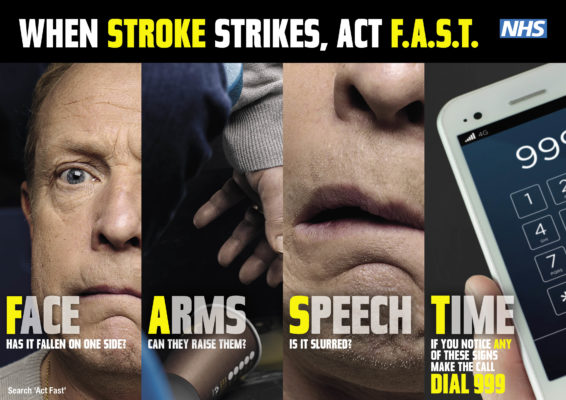
Know the signs of stroke
You could save your own or someone else’s life, or help limit the long-term effects of stroke, by learning to think and Act F.A.S.T.
F.A.S.T. or Face-Arms-Speech-Time is easy to remember and will help you to recognise if you or someone else is having a stroke.
Face – has their face fallen on one side? Can they smile?
Arms – can they raise both arms and keep them there?
Speech – is their speech slurred?
Time to call 999 if you see any single one of these signs of a stroke.
There are also other symptoms that may occasionally be due to stroke. They include:
Sudden loss of vision or blurred vision in one or both eyes
Sudden weakness or numbness on one side of your body (including your leg)
Sudden memory loss or confusion
Sudden dizziness, unsteadiness or a sudden fall, especially with any of the other symptoms
Why Act F.A.S.T?
If you notice any single one of the signs of stroke, call 999. The faster you act, the better the chance of recovery.
Read more at https://www.nhs.uk/actfast/Pages/know-the-signs.aspx#wL3HixMdjvFuIl5F.99
About stroke
What is a stroke?
A stroke is a ‘brain attack’ caused by a disturbance of the blood supply to the brain.
It’s a medical emergency that requires immediate medical attention, so recognising the signs of stroke and calling 999 for an ambulance is crucial.
The sooner somebody who is having a stroke gets urgent medical attention, the better their chances of a good recovery.
Could it be a TIA or mini-stroke?
A transient ischaemic attack (TIA) or ‘mini-stroke’ is similar to a stroke and has the same signs, but gets better within 24 hours. However, it could be a warning sign of a more serious stroke, so it also needs to be treated as an emergency by calling 999 immediately.
A quick diagnosis allows urgent steps to be taken to reduce the risk of having a stroke. If you think you have had a TIA in the past and have not sought treatment, contact your GP.
Reducing your risk
Some people are more at risk of having a stroke if they also have certain medical conditions, including:
High blood pressure
High cholesterol
Atrial fibrillation (an irregular heartbeat)
Diabetes
It is important that these conditions are carefully monitored and treated to reduce your chance of having a stroke.
The risk of having a stroke is higher among people in certain ethnic groups, including South Asian, African and Caribbean. This is partly because high blood pressure and diabetes are more common in these groups.
There are also lifestyle factors that may significantly increase the risk of having a stroke. They include:
Smoking
Being overweight
Lack of exercise
Poor diet
Excessive alcohol consumption
Leading a healthy, active lifestyle is vital to help reduce your risk of having a stroke.
For more information on how to do this, visit:
NHS Choices – stroke prevention
One You
Read more on https://www.nhs.uk/actfast/Pages/stroke.aspx


